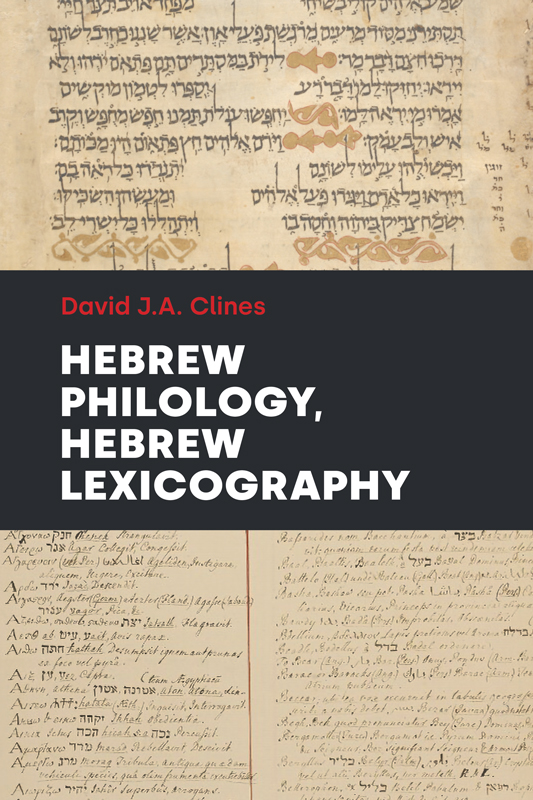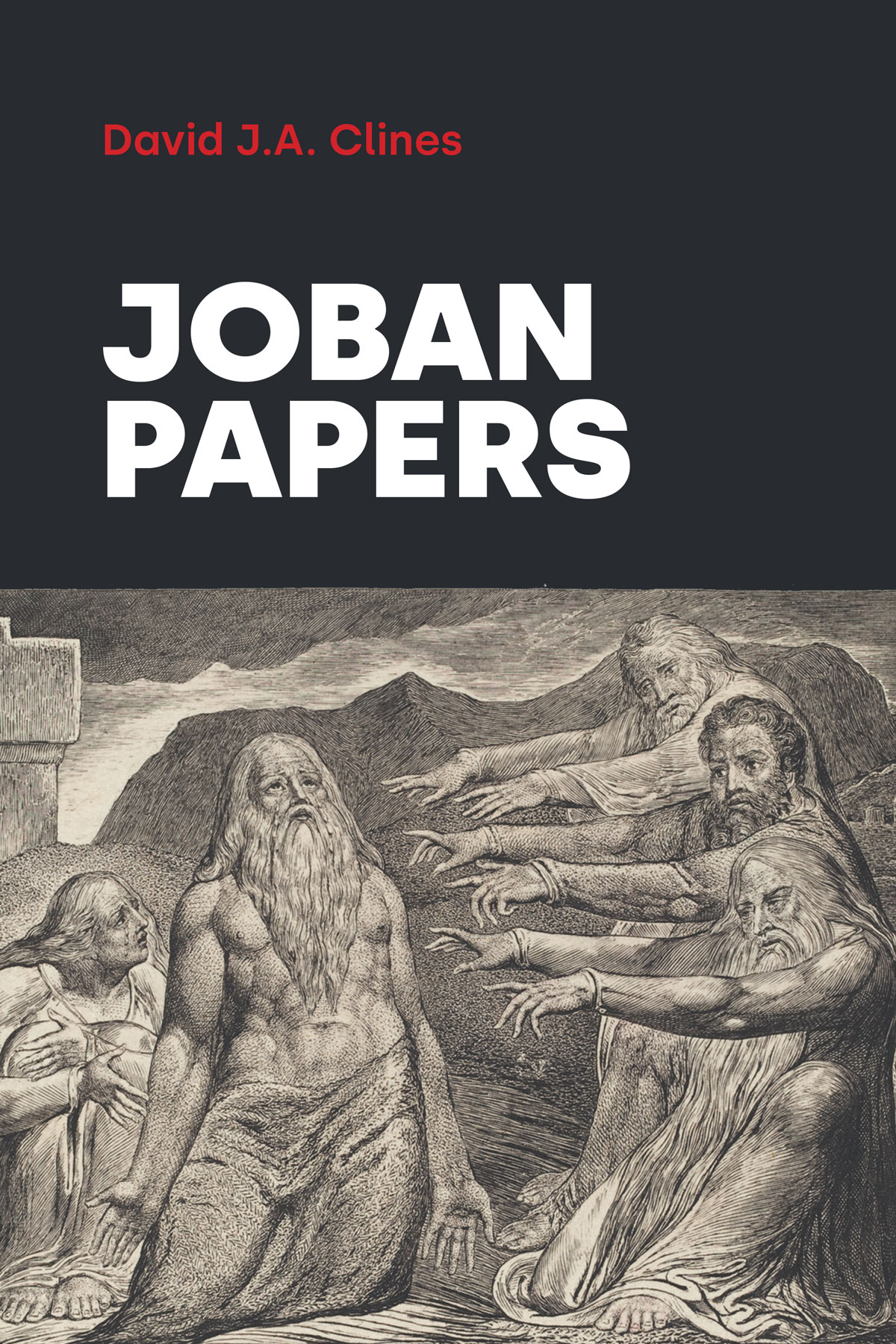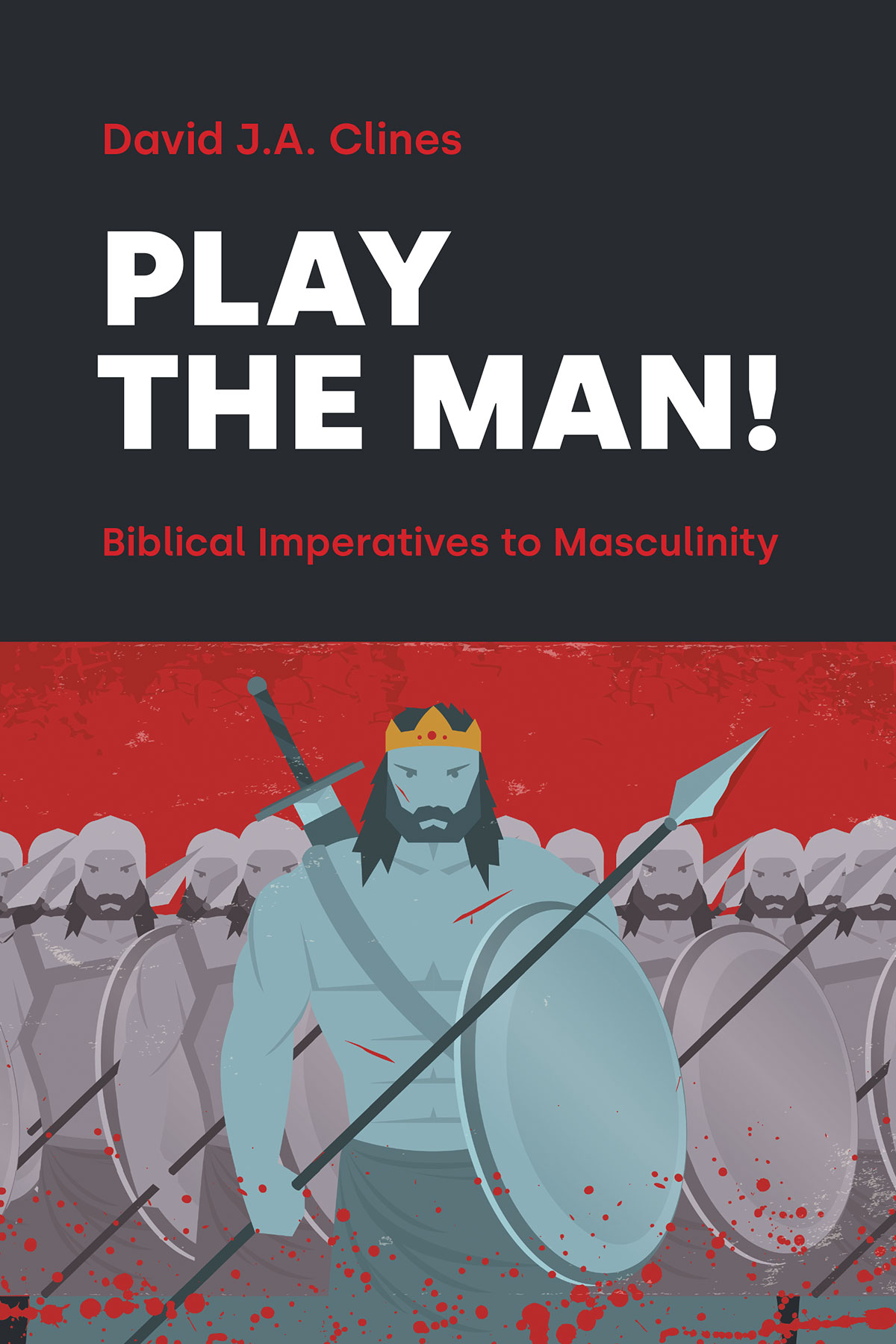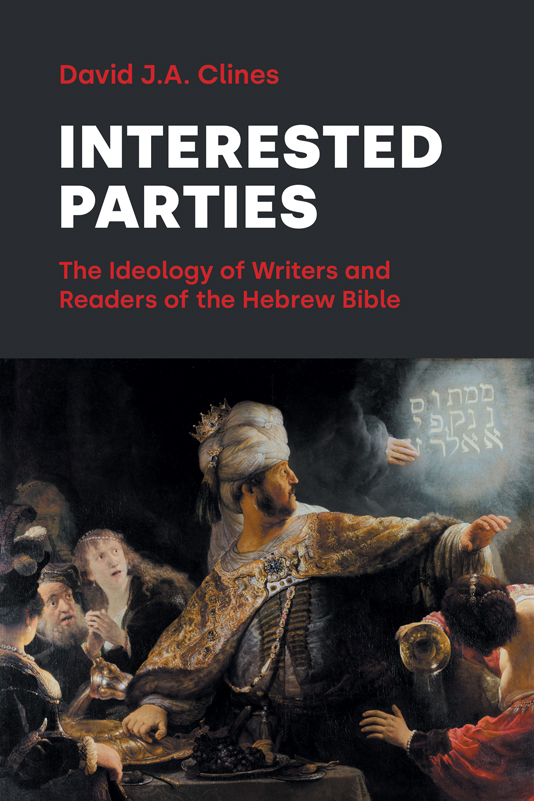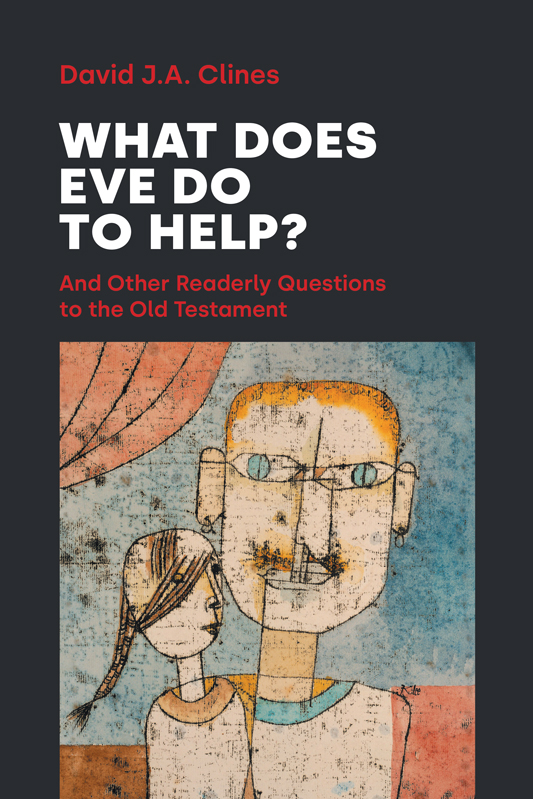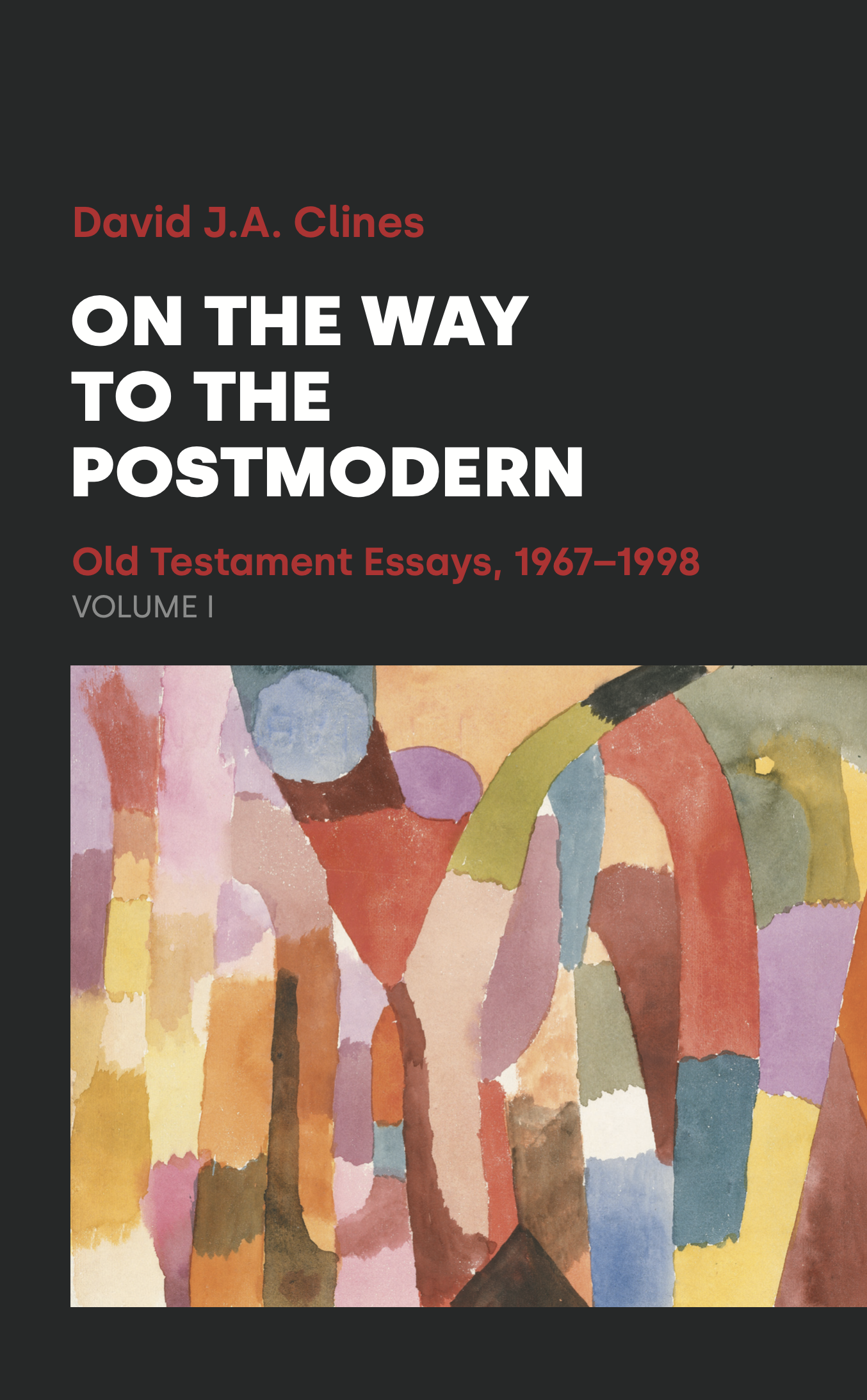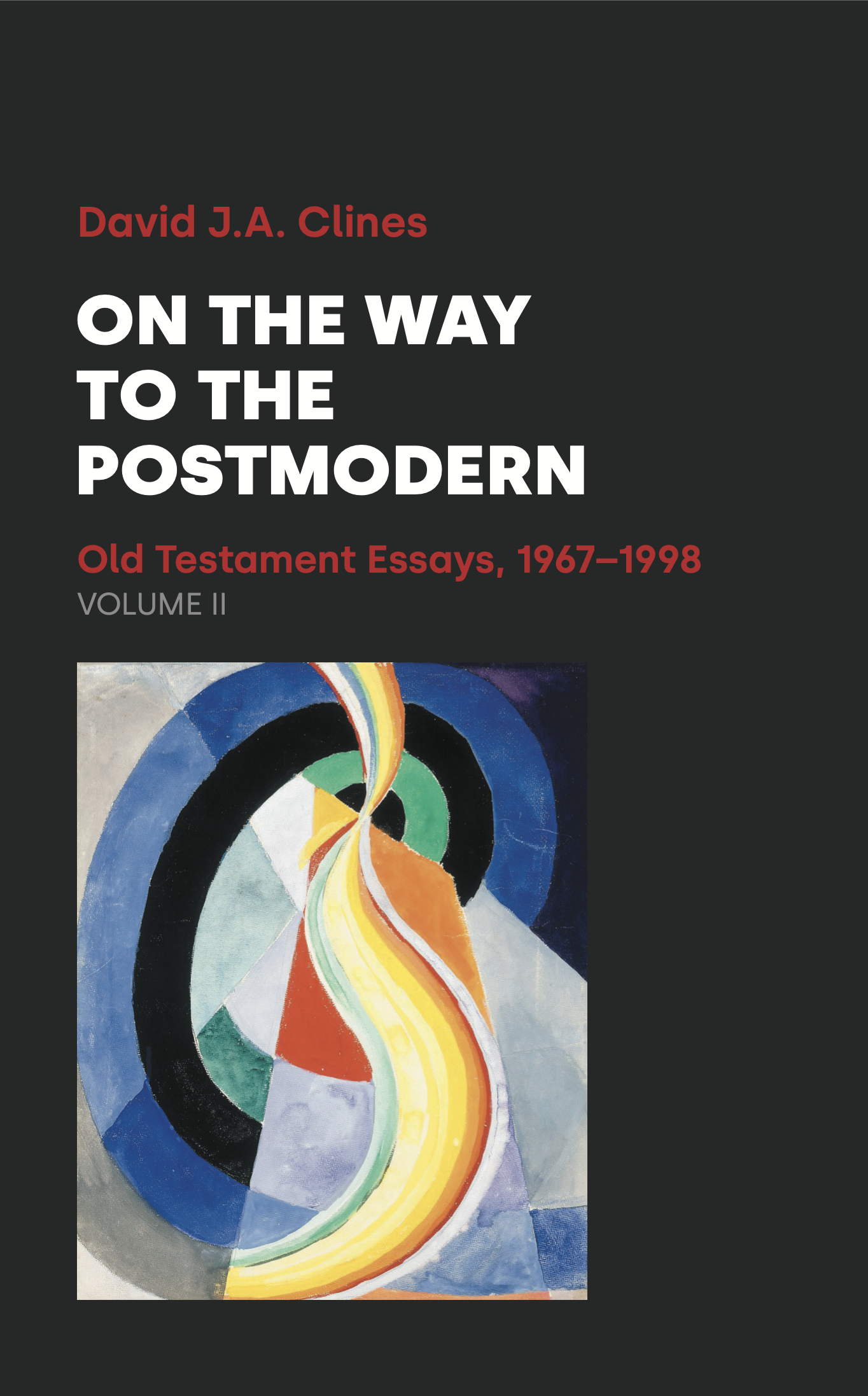Hebrew Philology, Hebrew Lexicography
Published: Nov 2025
£85.00
This edited collection, from world-leading philologist and lexicographer of Classical Hebrew, David J.A. Clines (1938–2022), demonstrates how his motivations for philological and lexicographical work sat in contrast to each other. These articles and papers, published and unpublished, show Clines’s efforts in each direction.
As Clines explains a “philologian is a ‘lover of words’ [...] a hunter, imbued with the spirit of the chase [...]. A lexicographer is by contrast a shepherd, gathering a flock together [...], big words and little words, common words and rare words [...]. To the lexicographer, all words are equally deserving of respect and nurture; a lexicographer cannot afford favourite love objects. [...] A philologian can polish off an article in 50 or 100 hours—or less–but a lexicographer must be long-lived, immune to boredom, and possessed of an addictive personality.”
In the first section, Philology, there are eight chapters, mostly on individual words. In the second section, Lexicography, there are eighteen chapters, dealing first with Clines’s Dictionary of Classical Hebrew in general (Chapters 9-14), then with features of the Dictionary that call for exposition and justification (Chapters 15-21), and finally with some individual studies arising from the lexicographical work (Chapters 22-26).
Via these articles and papers, Clines seeks to counter the lack from editors of earlier Hebrew dictionaries, which left scholars with little explanation of their methods and procedures. By explaining himself Clines wishes that present and future users of the Dictionary would know the conception of his intentions for the project. This Clinesian imperative means his views are explained, in general, about byforms, synonyms, semantic fields, definitions and suchlike, so readers are not left with only his conclusions.
Hebrew Philology, Hebrew Lexicography
£85.00
This edited collection, from world-leading philologist and lexicographer of Classical Hebrew, David J.A. Clines (1938–2022), demonstrates how his motivations for philological and lexicographical work sat in contrast to each other. These articles and papers, published and unpublished, show Clines’s efforts in each direction.
As Clines explains a “philologian is a ‘lover of words’ [...] a hunter, imbued with the spirit of the chase [...]. A lexicographer is by contrast a shepherd, gathering a flock together [...], big words and little words, common words and rare words [...]. To the lexicographer, all words are equally deserving of respect and nurture; a lexicographer cannot afford favourite love objects. [...] A philologian can polish off an article in 50 or 100 hours—or less–but a lexicographer must be long-lived, immune to boredom, and possessed of an addictive personality.”
In the first section, Philology, there are eight chapters, mostly on individual words. In the second section, Lexicography, there are eighteen chapters, dealing first with Clines’s Dictionary of Classical Hebrew in general (Chapters 9-14), then with features of the Dictionary that call for exposition and justification (Chapters 15-21), and finally with some individual studies arising from the lexicographical work (Chapters 22-26).
Via these articles and papers, Clines seeks to counter the lack from editors of earlier Hebrew dictionaries, which left scholars with little explanation of their methods and procedures. By explaining himself Clines wishes that present and future users of the Dictionary would know the conception of his intentions for the project. This Clinesian imperative means his views are explained, in general, about byforms, synonyms, semantic fields, definitions and suchlike, so readers are not left with only his conclusions.
Joban Papers
Published: Apr 2023
£75.00
In this volume, David J.A. Clines—known for his magisterial three-volume commentary on Job in the Word Biblical Commentary series (1989–2011)—brings together a sequence of 27 of his papers on his favourite biblical book from a variety of publications.
In two sections, the wide-ranging Syntheses and the more focused Probes on particular chapters, this collection is a necessary adjunct to his commentary.
Among the titles in the Syntheses are:
- On the Poetic Achievement of the Book of Job
- Why Is There a Book of Job, and What Does It Do to You If You Read It?
- Job’s Fifth Friend: An Ethical Critique of the Book of Job
- Deconstructing the Book of Job
Among the Probes the reader will find:
- False Naivety in the Prologue to Job
- In Search of the Indian Job
- Quarter Days Gone: Job 24 and the Absence of God
- Those Golden Days: Job and the Perils of Nostalgia
- Putting Elihu in his Place: A Proposal for the Relocation of Job 32–37
- One or Two Things You May Not Know about the Universe
- The Worth of Animals in the Book of Job
- Job’s Crafty Conclusion, and Seven Interesting Things about the Epilogue to Job
Joban Papers
£75.00
In this volume, David J.A. Clines—known for his magisterial three-volume commentary on Job in the Word Biblical Commentary series (1989–2011)—brings together a sequence of 27 of his papers on his favourite biblical book from a variety of publications.
In two sections, the wide-ranging Syntheses and the more focused Probes on particular chapters, this collection is a necessary adjunct to his commentary.
Among the titles in the Syntheses are:
- On the Poetic Achievement of the Book of Job
- Why Is There a Book of Job, and What Does It Do to You If You Read It?
- Job’s Fifth Friend: An Ethical Critique of the Book of Job
- Deconstructing the Book of Job
Among the Probes the reader will find:
- False Naivety in the Prologue to Job
- In Search of the Indian Job
- Quarter Days Gone: Job 24 and the Absence of God
- Those Golden Days: Job and the Perils of Nostalgia
- Putting Elihu in his Place: A Proposal for the Relocation of Job 32–37
- One or Two Things You May Not Know about the Universe
- The Worth of Animals in the Book of Job
- Job’s Crafty Conclusion, and Seven Interesting Things about the Epilogue to Job
Play the Man! Biblical Imperatives to Masculinity
Published: Apr 2023
£85.00
David J.A. Clines argues in Play the Man! that masculinity is a script, written for men by their societies, a script that men in their various cultures act out their whole lives long: 'no one is born a man'. He has been quick to deploy the insights of sociologists, historians, educationists, health professionals, psychologists and other scholars investigating masculinity in the contemporary and ancient worlds.
The book's title is a recognition of masculinity as performance, and the Bible's depictions of males in action as far more than information or entertainment; they function as demands on the men who read them or have them read to them. Hence the subtitle, Biblical Imperatives to Masculinity, presumes that every biblical reference to the masculine is some kind of authoritative command.
Clines—in this collection of writings prepared across three decades—has seen biblical texts as an excellent test bed for research into masculinity in one ancient culture as well as being an indubitable influence upon views and practices of masculinity in our own time.
The bulk of the book consists of studies of individual characters and texts of the Bible, analysing and profiling the masculinity that is there attested, assumed and encouraged. In conclusion, Clines reflects on the continuing impact of the biblical imperatives to masculinity, their effect on men, women and religion, in our own time.
Play the Man! Biblical Imperatives to Masculinity
£85.00
David J.A. Clines argues in Play the Man! that masculinity is a script, written for men by their societies, a script that men in their various cultures act out their whole lives long: 'no one is born a man'. He has been quick to deploy the insights of sociologists, historians, educationists, health professionals, psychologists and other scholars investigating masculinity in the contemporary and ancient worlds.
The book's title is a recognition of masculinity as performance, and the Bible's depictions of males in action as far more than information or entertainment; they function as demands on the men who read them or have them read to them. Hence the subtitle, Biblical Imperatives to Masculinity, presumes that every biblical reference to the masculine is some kind of authoritative command.
Clines—in this collection of writings prepared across three decades—has seen biblical texts as an excellent test bed for research into masculinity in one ancient culture as well as being an indubitable influence upon views and practices of masculinity in our own time.
The bulk of the book consists of studies of individual characters and texts of the Bible, analysing and profiling the masculinity that is there attested, assumed and encouraged. In conclusion, Clines reflects on the continuing impact of the biblical imperatives to masculinity, their effect on men, women and religion, in our own time.
Interested Parties: The Ideology of Writers and Readers of the Hebrew BIble
Price range: £17.50 through £50.00
There is a twin focus in this volume. The title of a keynote essay—‘Why Is There a Song of Songs, and What Does It Do to You If You Read It?’—hints at it. The focus is equally on the ideologies of the writers of the Hebrew Bible, who brought the text into being, and on the ideologies of its readers, who are being shaped by the text at the same moment that they are shaping it in their own image.
Uncovering the ideologies of writers are readers is the project of this book, calling for a step beyond the usual scholarly goal of understanding—to a practice of the art of critique.
Among the other chapters in this challenging book are:
• The Ten Commandments: Reading from Left to Right
• Metacommentating Amos
• Haggai’s Temple, Constructed, Deconstructed and Reconstructed
• David the Man: The Construction of Masculinity in the Hebrew Bible
• Psalm 2 and the MLF (Moabite Liberation Front)
• God in the Pentateuch: Reading against the Grain
This is a reprint of the original 1995 edition.
Interested Parties: The Ideology of Writers and Readers of the Hebrew BIble
Price range: £17.50 through £50.00
There is a twin focus in this volume. The title of a keynote essay—‘Why Is There a Song of Songs, and What Does It Do to You If You Read It?’—hints at it. The focus is equally on the ideologies of the writers of the Hebrew Bible, who brought the text into being, and on the ideologies of its readers, who are being shaped by the text at the same moment that they are shaping it in their own image.
Uncovering the ideologies of writers are readers is the project of this book, calling for a step beyond the usual scholarly goal of understanding—to a practice of the art of critique.
Among the other chapters in this challenging book are:
• The Ten Commandments: Reading from Left to Right
• Metacommentating Amos
• Haggai’s Temple, Constructed, Deconstructed and Reconstructed
• David the Man: The Construction of Masculinity in the Hebrew Bible
• Psalm 2 and the MLF (Moabite Liberation Front)
• God in the Pentateuch: Reading against the Grain
This is a reprint of the original 1995 edition.
What Does Eve Do to Help? And Other Readerly Questions to the Old Testament
£50.00
Readerly questions are raised when readers are explicitly and programmatically brought into the process of interpreting texts. Traditionally, the reader and readerly interest and identities have been screened out when we have set about interpreting texts, and we have set our sights on attaining an interpretation that should be as objective as possible.
Things are rather different now. Not only is quest for objective interpretation seen as chimaera, but the rewards of unabashed readerly interpretations that foreground the process of reading and the context of the reader have now been shown to be very well worth seeking. That reader-response approach characterizes this collection of six essays, prefaced by an introduction to reader-response criticism.
The essays for the most part read in their original form to meetings of the Society of Biblical Literature, are: What Does Eve Do To Help? and other Irredeemably Androcentric Orientations in Genesis 1-3; What Happens in Genesis; The Ancestor in Danger: But Not the Same Danger; The Old Testament Histories: A Reader's Guide; Deconstructing the Book of Job; and Nehemiah Memoir: The perils of Autobiography.
This volume is a reprint of the original 1990 edition.
What Does Eve Do to Help? And Other Readerly Questions to the Old Testament
£50.00
Readerly questions are raised when readers are explicitly and programmatically brought into the process of interpreting texts. Traditionally, the reader and readerly interest and identities have been screened out when we have set about interpreting texts, and we have set our sights on attaining an interpretation that should be as objective as possible.
Things are rather different now. Not only is quest for objective interpretation seen as chimaera, but the rewards of unabashed readerly interpretations that foreground the process of reading and the context of the reader have now been shown to be very well worth seeking. That reader-response approach characterizes this collection of six essays, prefaced by an introduction to reader-response criticism.
The essays for the most part read in their original form to meetings of the Society of Biblical Literature, are: What Does Eve Do To Help? and other Irredeemably Androcentric Orientations in Genesis 1-3; What Happens in Genesis; The Ancestor in Danger: But Not the Same Danger; The Old Testament Histories: A Reader's Guide; Deconstructing the Book of Job; and Nehemiah Memoir: The perils of Autobiography.
This volume is a reprint of the original 1990 edition.
On the Way to the Postmodern: Volume I
£50.00
In the 50 chapters of these two volumes, David J. A. Clines presents a series of discourses, spanning three decades, from an increasingly postmodern perspective. Rather than using only methods of deconstruction, he combines traditional methods with postmodern ideas of analysis, resulting in a substantial reading of the Hebrew Bible.
Clines’s selected sequence of articles and papers—ten of them not previously published—displays a golden thread of a scholar’s journey in biblical interpretation. Some of the papers, like 'The Evidence for an Autumnal New Year in Pre-exilic Israel Reconsidered', are far from postmodern in their outlook, and sit in intriguing juxtaposition with others such as 'The Postmodern Adventure in Biblical Studies'.
The essays are organized in eight sections;
- Method, Literature, History (Vol. I.),
- Theology, Language, Psalms, Job, and, entertainingly, Divertimenti (Vol. II). They include 'Reading Esther from Left to Right', 'Beyond Synchronic Diachronic', 'Story and Poem: The Old Testament as Literature and as Scripture', 'In Search of the Indian Job', and 'Philology and Power'.
Further items in this first volume to highlight are:
- Possibilities and Priorities of Biblical Interpretation in an International Perspective
- What Has (and Has Not) Happened at SBL International Meetings
- The Force of the Text: A Response to Tamara C. Eskenazi
- In Quest of the Historical Mordecai
On the Way to the Postmodern: Volume I
£50.00
In the 50 chapters of these two volumes, David J. A. Clines presents a series of discourses, spanning three decades, from an increasingly postmodern perspective. Rather than using only methods of deconstruction, he combines traditional methods with postmodern ideas of analysis, resulting in a substantial reading of the Hebrew Bible.
Clines’s selected sequence of articles and papers—ten of them not previously published—displays a golden thread of a scholar’s journey in biblical interpretation. Some of the papers, like 'The Evidence for an Autumnal New Year in Pre-exilic Israel Reconsidered', are far from postmodern in their outlook, and sit in intriguing juxtaposition with others such as 'The Postmodern Adventure in Biblical Studies'.
The essays are organized in eight sections;
- Method, Literature, History (Vol. I.),
- Theology, Language, Psalms, Job, and, entertainingly, Divertimenti (Vol. II). They include 'Reading Esther from Left to Right', 'Beyond Synchronic Diachronic', 'Story and Poem: The Old Testament as Literature and as Scripture', 'In Search of the Indian Job', and 'Philology and Power'.
Further items in this first volume to highlight are:
- Possibilities and Priorities of Biblical Interpretation in an International Perspective
- What Has (and Has Not) Happened at SBL International Meetings
- The Force of the Text: A Response to Tamara C. Eskenazi
- In Quest of the Historical Mordecai
On the Way to the Postmodern: Volume II
£50.00
In the 50 chapters of these two volumes, David J. A. Clines presents a series of discourses, spanning three decades, from an increasingly postmodern perspective. Rather than using only methods of deconstruction, he combines traditional methods with postmodern ideas of analysis, resulting in a substantial reading of the Hebrew Bible.
Clines’s selected sequence of articles and papers—ten of them not previously published—displays a golden thread of a scholar’s journey in biblical interpretation. Some of the papers, like 'The Evidence for an Autumnal New Year in Pre-exilic Israel Reconsidered', are far from postmodern in their outlook, and sit in intriguing juxtaposition with others such as 'The Postmodern Adventure in Biblical Studies'.
The essays are organized in eight sections;
- Method, Literature, History (Vol. I.),
- Theology, Language, Psalms, Job, and, entertainingly, Divertimenti (Vol. II). They include 'Reading Esther from Left to Right', 'Beyond Synchronic Diachronic', 'Story and Poem: The Old Testament as Literature and as Scripture', 'In Search of the Indian Job', and 'Philology and Power'.
Further items in this second volume to highlight are:
Sacred Space, Holy Places and Suchlike
The Dictionary of Classical Hebrew
Universal Dominion in Psalm 2?
False Naivety in the Prologue to Job
New Directions in Pooh Studies.
This volume is a reprint of the original 1998 edition.
On the Way to the Postmodern: Volume II
£50.00
In the 50 chapters of these two volumes, David J. A. Clines presents a series of discourses, spanning three decades, from an increasingly postmodern perspective. Rather than using only methods of deconstruction, he combines traditional methods with postmodern ideas of analysis, resulting in a substantial reading of the Hebrew Bible.
Clines’s selected sequence of articles and papers—ten of them not previously published—displays a golden thread of a scholar’s journey in biblical interpretation. Some of the papers, like 'The Evidence for an Autumnal New Year in Pre-exilic Israel Reconsidered', are far from postmodern in their outlook, and sit in intriguing juxtaposition with others such as 'The Postmodern Adventure in Biblical Studies'.
The essays are organized in eight sections;
- Method, Literature, History (Vol. I.),
- Theology, Language, Psalms, Job, and, entertainingly, Divertimenti (Vol. II). They include 'Reading Esther from Left to Right', 'Beyond Synchronic Diachronic', 'Story and Poem: The Old Testament as Literature and as Scripture', 'In Search of the Indian Job', and 'Philology and Power'.
Further items in this second volume to highlight are:
Sacred Space, Holy Places and Suchlike
The Dictionary of Classical Hebrew
Universal Dominion in Psalm 2?
False Naivety in the Prologue to Job
New Directions in Pooh Studies.
This volume is a reprint of the original 1998 edition.

